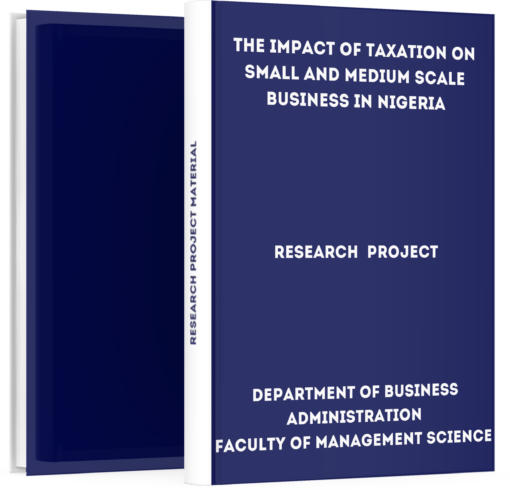The Impact Of Taxation On Small And Medium Scale Buisiness In Nigeria (PDF)
₦3,000.00
If you are interested in getting this project material “The Impact Of Taxation On Small And Medium Scale Buisiness In Nigeria (PDF)”, click on the DOWNLOAD BUTTON to make payment and the file will be delivered to your email immediately after confirmation.
Description
– The Impact Of Taxation On Small And Medium Scale Buisiness In Nigeria (PDF) –
Download The Impact Of Taxation On Small And Medium Scale Buisiness In Nigeria . Students who are writing their projects can get this material to aid their research work.
Abstract
The study was carried out to find out the impact of taxes on small and medium scale business enterprises in Nigeria. The study aimed at assessing the performance of business enterprises in Nigeria, finding out if taxpayers are aware of all their tax obligations, policies and problems affecting them as well as their businesses.
The study applied both qualitative and quantitative research designs where interviews and questionnaires were used. Data were collected from both primary and secondary sources.
Data were processed and analysed using formal tables, pie charts, narrative text, and correlation to find out the relationship between the impact of taxes and performance of small scale businesses.
A total of 50 respondents were considered out of the entire population of small scale and medium enterprises. The findings indicated that the performance of small scale business is affected by stock levels, capital employed, daily expenses, daily sales and the average amount of taxes paid annually.
Most business owners are aware of taxes paid, uncertain of the mode of assessment and little assistance is given as regards tax awareness.
The findings revealed the problems faced by the small and medium businessmen as regards mode of assessment, collection and tax collectors, inefficiency by tax collectors, loss of equipment, loss of sales and loss of stock as a result of taxes.
Recommendations on the impact of taxes included; an improvement on the method of collecting taxes, educating the business community about its different tax rates and introducing a scheme that allows taxpayers to pay the tax obligation.
Introduction
1.1 Background of the Study
Taxation increases incentives for public participation in the political process and creates pressure for more accountability, better governance, and improved efficiency of government spending.
Taxation also creates incentives for governments to upgrade their institutions for tax collection and administration and to provide more public services (Moore, 2007).
Taxes have existed virtually as long as there have been organized governments. The first tax law legislation was introduced in 1919 and ever since then taxes have evolved through a number of reforms.
The government in an attempt to widen the tax base and collect more revenue has had to levy several taxes especially on business enterprises in Nigeria which constitute a large part of the formal sector.
The taxes charged on business enterprises in Nigeria include; corporation tax, value added tax, presumption tax and exercise duty. In 1997 the Income Tax Act was made. This was to give guidance in assessment and computation of taxes (Campsy, 1997).
The Nigerian government has made some recommendable efforts to promote development through taxation since the inception of the current taxation laws for purposes of promoting development.
The main objective of taxation in Nigeria has always been to mobilise resources needed to meet the aspiration of government.
This is because for any government to be effective, strong, competent and capable of spearheading development, resources have to be readily available in its treasury so as to be in position to provide goods and services to the people adequately. The Nigerian government has always had to ensure proper resource mobilization (Musa, 1992).
According to Manasseh (2000), a tax is generally referred to as a compulsory levy imposed by government upon various categories of assets and taxation is a compulsory and non refundable contribution imposed by government for public purposes.
In Nigeria a considerable fraction of the businesses are sole traders operating small scale business, locally owned and managed by individuals or families and often with very few employees working at a single location (Nigeria development bank report, 1988).
How to Download this Project Material
First, note that we are one of the best and most reliable online platforms because we don’t retain any of your personal information or data as regards making payments online.
PRICE: ₦3,500 ₦3,000 (Three Thousand Naira Only)
Make a bank deposit or mobile transfer of ₦2,000 only to the account given below;
Bank Name: UBA Account Number: 1022564031 Account Name: TMLT PRO SERVICES
After making the payment, CLICK HERE to send the following on WhatsApp;
- Depositor’s Name or Screenshot of Payment
- Name of the Past Question
- Active Email Address
or Call Us On +2348082284439 Once your details have been received and your payment confirmed by us, you will receive the past question in your email or WhatsApp within 5 Minutes.
Guarantee of Getting the Material
We understand that due to the high rate of fraud, many people are afraid of making purchases online but be rest assured that PastExamQuestions will deliver your material after payment.
Once your details have been received and your payment confirmed by us, you will receive the past question in your email or WhatsApp.
Give us Feedback
Have we been able to satisfy you? How well do you think the material will be helpful after having gone through it? Does the price worth the material?
Let’s hear from you! We recommend that our customers give feedback at the end of every transaction to enable us to serve better. You can do this by clicking the review button on this page.
Where is the review button? >> Just scroll up to where you see reviews





Reviews
There are no reviews yet.